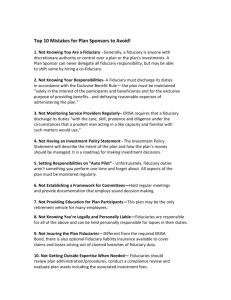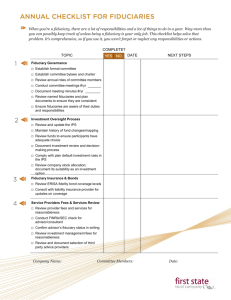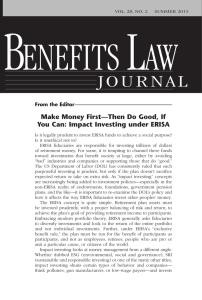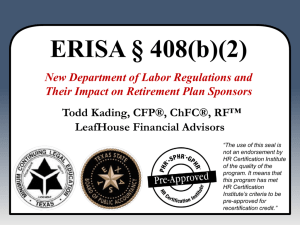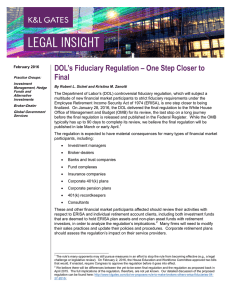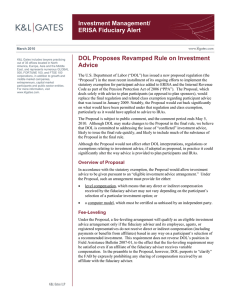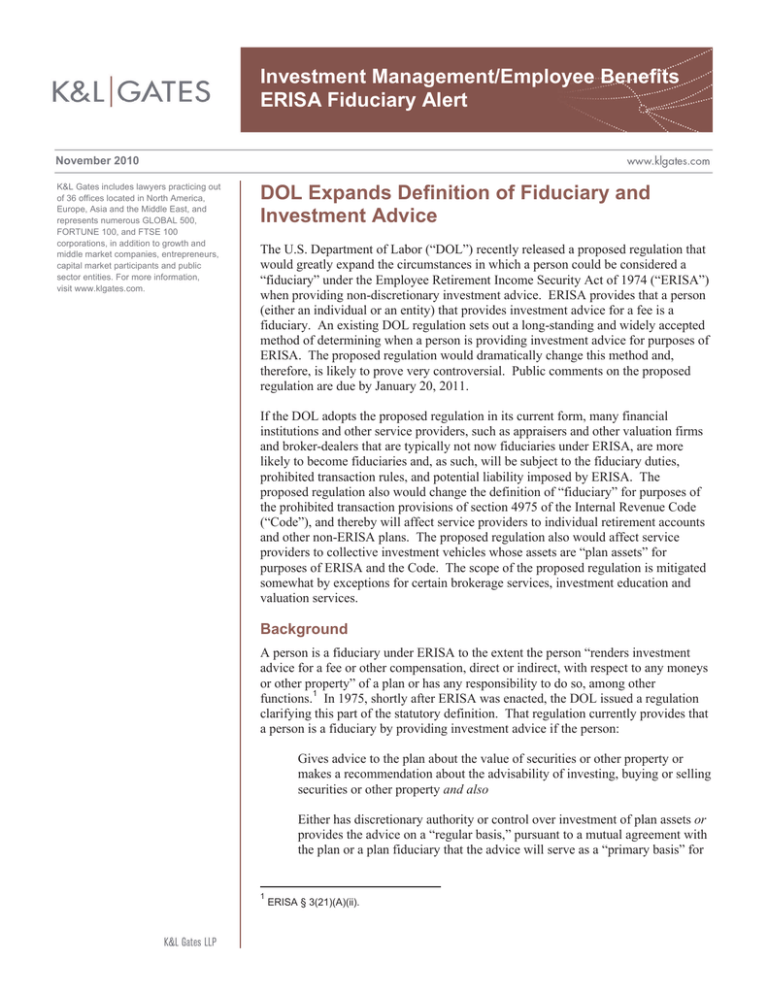
Investment Management/Employee Benefits
ERISA Fiduciary Alert
November 2010
K&L Gates includes lawyers practicing out
of 36 offices located in North America,
Europe, Asia and the Middle East, and
represents numerous GLOBAL 500,
FORTUNE 100, and FTSE 100
corporations, in addition to growth and
middle market companies, entrepreneurs,
capital market participants and public
sector entities. For more information,
visit www.klgates.com.
DOL Expands Definition of Fiduciary and
Investment Advice
The U.S. Department of Labor (“DOL”) recently released a proposed regulation that
would greatly expand the circumstances in which a person could be considered a
“fiduciary” under the Employee Retirement Income Security Act of 1974 (“ERISA”)
when providing non-discretionary investment advice. ERISA provides that a person
(either an individual or an entity) that provides investment advice for a fee is a
fiduciary. An existing DOL regulation sets out a long-standing and widely accepted
method of determining when a person is providing investment advice for purposes of
ERISA. The proposed regulation would dramatically change this method and,
therefore, is likely to prove very controversial. Public comments on the proposed
regulation are due by January 20, 2011.
If the DOL adopts the proposed regulation in its current form, many financial
institutions and other service providers, such as appraisers and other valuation firms
and broker-dealers that are typically not now fiduciaries under ERISA, are more
likely to become fiduciaries and, as such, will be subject to the fiduciary duties,
prohibited transaction rules, and potential liability imposed by ERISA. The
proposed regulation also would change the definition of “fiduciary” for purposes of
the prohibited transaction provisions of section 4975 of the Internal Revenue Code
(“Code”), and thereby will affect service providers to individual retirement accounts
and other non-ERISA plans. The proposed regulation also would affect service
providers to collective investment vehicles whose assets are “plan assets” for
purposes of ERISA and the Code. The scope of the proposed regulation is mitigated
somewhat by exceptions for certain brokerage services, investment education and
valuation services.
Background
A person is a fiduciary under ERISA to the extent the person “renders investment
advice for a fee or other compensation, direct or indirect, with respect to any moneys
or other property” of a plan or has any responsibility to do so, among other
functions.1 In 1975, shortly after ERISA was enacted, the DOL issued a regulation
clarifying this part of the statutory definition. That regulation currently provides that
a person is a fiduciary by providing investment advice if the person:
Gives advice to the plan about the value of securities or other property or
makes a recommendation about the advisability of investing, buying or selling
securities or other property and also
Either has discretionary authority or control over investment of plan assets or
provides the advice on a “regular basis,” pursuant to a mutual agreement with
the plan or a plan fiduciary that the advice will serve as a “primary basis” for
1
ERISA § 3(21)(A)(ii).
Investment Management and Employee Benefits
ERISA Fiduciary Alert
investment decisions and the advice is
individualized based on the particular needs
of the plan.
(C) Advice or recommendations as to the
management of securities and other
property,
This regulation provides a relatively simple test for
distinguishing between persons who should be
subject to ERISA’s fiduciary rules because they are
providing investment advice to plans (or plan
fiduciaries) and other persons who may discuss
investments generally (e.g., in a sales context), but
who are not central to decisions about plan
investments. The test has been widely adopted and
relied upon by courts.
and
(ii)
(A) Represents or acknowledges that it is
an ERISA fiduciary with respect to the
advice or recommendations;
(B) Is otherwise a fiduciary under
Section 3(21)(A)(i) or (iii) of ERISA;
The DOL believes that this test has become outdated
and unnecessarily limits the scope of the statute. In
the preamble to the proposed regulation, the DOL
tellingly asserts that the current regulation has
hampered DOL enforcement actions against certain
“consultants, advisers and appraisers.” In the DOL’s
view, those persons significantly influence the
decisions of plan fiduciaries and have a considerable
impact on plan investments. However, if those
persons are not fiduciaries under ERISA, the DOL
asserts “they may operate with conflicts of interest
that they need not disclose to plan fiduciaries . . .
and have limited liability under ERISA for the
advice they provide.”2
(C) Is an “investment adviser” within the
meaning of the Investment Advisers Act
of 1940 (“Advisers Act”) (without
regard to whether the adviser is required
to be registered); or
(D) Provides the advice or makes the
recommendations pursuant to an
agreement, arrangement or
understanding between the plan (or plan
fiduciary, participant or beneficiary) that
the advice or recommendations “may be
considered in connection with”
investment decisions involving the
plan’s assets, and the advice is
individualized based on the particular
needs of the plan, plan fiduciary or
participant or beneficiary.3
The Proposed Regulation
To remedy these problems and subject more persons
to ERISA’s fiduciary rules, the proposed regulation
would delete much of the current regulation’s test
and provide that a person is an ERISA fiduciary if
the person provides to a plan, plan fiduciary, plan
participant or beneficiary:
(i)
(A) Advice, or an appraisal or fairness
opinion about the value of securities or
other property,
(B) Recommendations as to the
advisability of investing, buying or
selling securities or other property, or
2
78 Fed. Reg. 65263, 65265 (Oct. 22, 2010).
the person:
Effect of the Proposed Regulation
The proposed regulation expands the circumstances
in which a person may be considered to be
providing investment advice under ERISA and the
Code. Most significantly, the new test would
eliminate the “regular basis” and “primary basis”
elements of the current regulation. Together, these
changes would make many persons fiduciaries who
currently are not fiduciaries. Some examples may
illustrate the sweep of the proposed regulation
compared to the current regulation.
3
Id. at 65277.
November 2010
2
Investment Management and Employee Benefits
ERISA Fiduciary Alert
·
·
·
A plan fiduciary retains an appraiser to
determine the fair market value of a parcel of
real estate or a block of closely held stock. The
proposed regulation appears to deem the
appraiser’s determination to be investment
advice. Moreover, because the appraiser’s
determination of value will almost certainly be
considered in connection with the plan
fiduciary’s decision to buy or sell the property
or stock (indeed, it could be imprudent for the
plan fiduciary to fail to consider it), the
appraiser will be a fiduciary for purposes of
Section 3(21)(A)(ii) of ERISA, even if the
appraisal report is nothing more than a neutral
statement of the asset’s probable fair market
value and the steps taken to determine that
value. The appraiser would not be a fiduciary
under the current regulation.
investment managers that might be appropriate
for the plan. The trustees will select from
among the three recommended investment
managers. Under the proposed regulation, the
consultant likely would be a fiduciary because it
is making recommendations as to the
management of the plan’s assets. Although
some courts have held that consultants are
fiduciaries in similar contexts, the consultant
would not be a fiduciary under the current
regulation because it is not providing advice
about securities or other property.
Exceptions under the Proposed
Regulation
Perhaps recognizing the sweep of the proposed
regulation, the DOL also proposed the following
exceptions to the revised definition:
An investment manager uses a broker-dealer to
execute trades for its clients, including plans.
The broker-dealer periodically provides
information to the investment manager about a
publicly traded security or an investment or
commodities contract such as a swap or futures
agreement. Although the investment manager
has full discretion to invest assets of the plan
and does so using its own investment process,
the investment manager may consider
information provided by the broker and the
broker-dealer is aware of this. Even if the
investment manager never uses the information
provided by the broker-dealer as a primary basis
for the manager’s investment decisions for its
plan clients, the broker-dealer may be a
fiduciary under the proposed regulation because
there is arguably “an understanding” between
the broker-dealer and the investment manager
that the investment manager may consider the
broker-dealer’s information. The broker-dealer
would not be a fiduciary under the current
regulation.
·
Financial Sales Activities – Any person who
provides advice or makes recommendations
(other than a person who has acknowledged that
it is an ERISA fiduciary) about a security or
property is not a fiduciary but only if the person
providing the advice or recommendation can
demonstrate that (i) the recipient of the advice
or recommendation knew or should have known
that the advice or recommendation was
provided in the person’s own capacity as a
purchaser or seller of a security or other
property (or as an agent of or appraiser for such
a purchaser or seller) whose interests are
adverse to the plan or participant and (ii) that
the person is not undertaking to provide
impartial investment advice.
·
Investment Education – The proposed
regulation confirms the DOL’s previously
expressed view that providing “investment
education,” as described in the DOL’s 1996
interpretive bulletin,4 is not deemed to be
investment advice.
A pension plan retains a consultant, which is
registered under the Advisers Act. The
consultant is asked to help identify potential
investment managers for certain asset classes
and, as to any asset class, recommend three
·
Marketing or Platform Services – Marketing or
making available (through “a platform or
4
29 C.F.R. § 2509.96-1(d).
November 2010
3
Investment Management and Employee Benefits
ERISA Fiduciary Alert
similar mechanism”) investment options a plan
sponsor may select for plan participants does not
make the provider of these services a fiduciary,
but only if (i) the investment options are made
available without regard to the individualized
needs of the plan or its participants and (ii) the
service provider makes written disclosure to the
plan that it is not providing impartial investment
advice.
·
·
Provision of Investment-related Information –
The provision of general financial information
or data in connection with a plan fiduciary’s
selection and monitoring of investments will not
cause the provider of such information or data to
be deemed a fiduciary, but only if the provider
makes written disclosure to the plan that it is not
providing impartial investment advice.
Appraisals and Valuations – The term “advice,
appraisal or fairness opinion” (that could make
the provider a fiduciary) does not include a
report or statement that reflects the value of a
plan investment and is provided for purposes of
compliance with the reporting and disclosure
requirements of ERISA and the Code, unless the
report or statement (i) covers an asset for which
there is not a generally recognized market, and
(ii) serves as a basis on which a plan may make
distributions to participants.
Further Observations
If adopted in its current form, the proposed
regulation will have far-reaching consequences that
may include, for example, expanded responsibility
and liability for persons who are not now fiduciaries,
expanded co-fiduciary responsibility for persons
who are currently fiduciaries, and a greater risk that
commonly used prohibited transaction exemptions
will not be available to the extent that these
exemptions depend on one (or more) parties not
being a fiduciary.
Also, if adopted in its current form, the proposed
regulation may not have the effect that the DOL
desires. Faced with the possibility of new and very
broad liability, many financial service providers may
decide not to provide information or services to
plans, at least not at their current level of
compensation. Moreover, service providers may
elect to do so only if they obtain indemnification
from the plan sponsor (to the extent permitted by
law) or if plan fiduciaries make representations that
are undesirable or unworkable (e.g., representations
that effectively require a fiduciary to state that it
will not consider any information offered by a
service provider). Finally, because the proposed
regulation attempts to regulate areas that may now
be governed by state law (e.g., state statutory or
decisional law regarding defective appraisals), the
DOL may inadvertently deprive plans of remedies
that are available under state law but that might be
preempted by the proposed regulation.
It is possible that the exceptions included in the
proposed regulation – particularly the exception
relating to financial sales activities – may mean that
some service providers can continue to provide
services without being deemed to be fiduciaries.
However, invoking this exception would require
disclosures that could be viewed as effectively
encouraging other plan fiduciaries not to take the
advice or recommendations into account. Thus, it
remains to be seen whether this and other
exceptions will provide meaningful relief from the
likely impact of the proposed regulation.
Although some aspects of the proposed regulation
are sensible (such as formalizing the DOL’s view
that investment advice to a participant is investment
advice to a plan for purposes of Section 3(21)(A)(ii)
of ERISA) or mirror other legal developments
(courts have held that consultants are fiduciaries
when they help select or evaluate investment
managers), others are questionable. The proposed
regulation is likely to be controversial among many
sectors of the market for financial services and
information. Additionally, the DOL’s request for
comments about how the proposed regulation
should apply to advice or recommendations
concerning distributions and rollovers may generate
concerns among plan sponsors and service providers
that assist with distributions. It is anticipated that
the DOL will receive extensive comments as the
January 20, 2011 deadline approaches.
November 2010
4
Investment Management and Employee Benefits
ERISA Fiduciary Alert
Please contact any member of the ERISA Fiduciary
Group listed below if you have further questions.
Catherine S. Bardsley
catherine.bardsley@klgates.com
202-778-9289
William A. Schmidt
william.schmidt@klgates.com
202-778-9373
Mark J. Duggan
mark.duggan@klgates.com
617-261-3156
Charles R. Smith
charles.smith@klgates.com
412-355-6536
John J. Nestico
john.nestico@klgates.com
704-331-7529
William P. Wade
william.wade@klgates.com
310-552-5071
David Pickle
david.pickle@klgates.com
202-778-9887
Kristina M. Zanotti
kristina.zanotti@klgates.com
202-778-9171
Anchorage Austin Beijing Berlin Boston Charlotte Chicago Dallas Dubai Fort Worth Frankfurt Harrisburg Hong Kong London
Los Angeles Miami Moscow Newark New York Orange County Palo Alto Paris Pittsburgh Portland Raleigh Research Triangle Park
San Diego San Francisco Seattle Shanghai Singapore Spokane/Coeur d’Alene Taipei Tokyo Warsaw
Washington, D.C.
K&L Gates includes lawyers practicing out of 36 offices located in North America, Europe, Asia and the Middle East, and represents numerous
GLOBAL 500, FORTUNE 100, and FTSE 100 corporations, in addition to growth and middle market companies, entrepreneurs, capital market
participants and public sector entities. For more information, visit www.klgates.com.
K&L Gates comprises multiple affiliated entities: a limited liability partnership with the full name K&L Gates LLP qualified in Delaware and
maintaining offices throughout the United States, in Berlin and Frankfurt, Germany, in Beijing (K&L Gates LLP Beijing Representative Office), in
Dubai, U.A.E., in Shanghai (K&L Gates LLP Shanghai Representative Office), in Tokyo, and in Singapore; a limited liability partnership (also named
K&L Gates LLP) incorporated in England and maintaining offices in London and Paris; a Taiwan general partnership (K&L Gates) maintaining an
office in Taipei; a Hong Kong general partnership (K&L Gates, Solicitors) maintaining an office in Hong Kong; a Polish limited partnership (K&L
Gates Jamka sp.k.) maintaining an office in Warsaw; and a Delaware limited liability company (K&L Gates Holdings, LLC) maintaining an office in
Moscow. K&L Gates maintains appropriate registrations in the jurisdictions in which its offices are located. A list of the partners or members in each
entity is available for inspection at any K&L Gates office.
This publication is for informational purposes and does not contain or convey legal advice. The information herein should not be used or relied upon
in regard to any particular facts or circumstances without first consulting a lawyer.
©2010 K&L Gates LLP. All Rights Reserved.
November 2010
5

